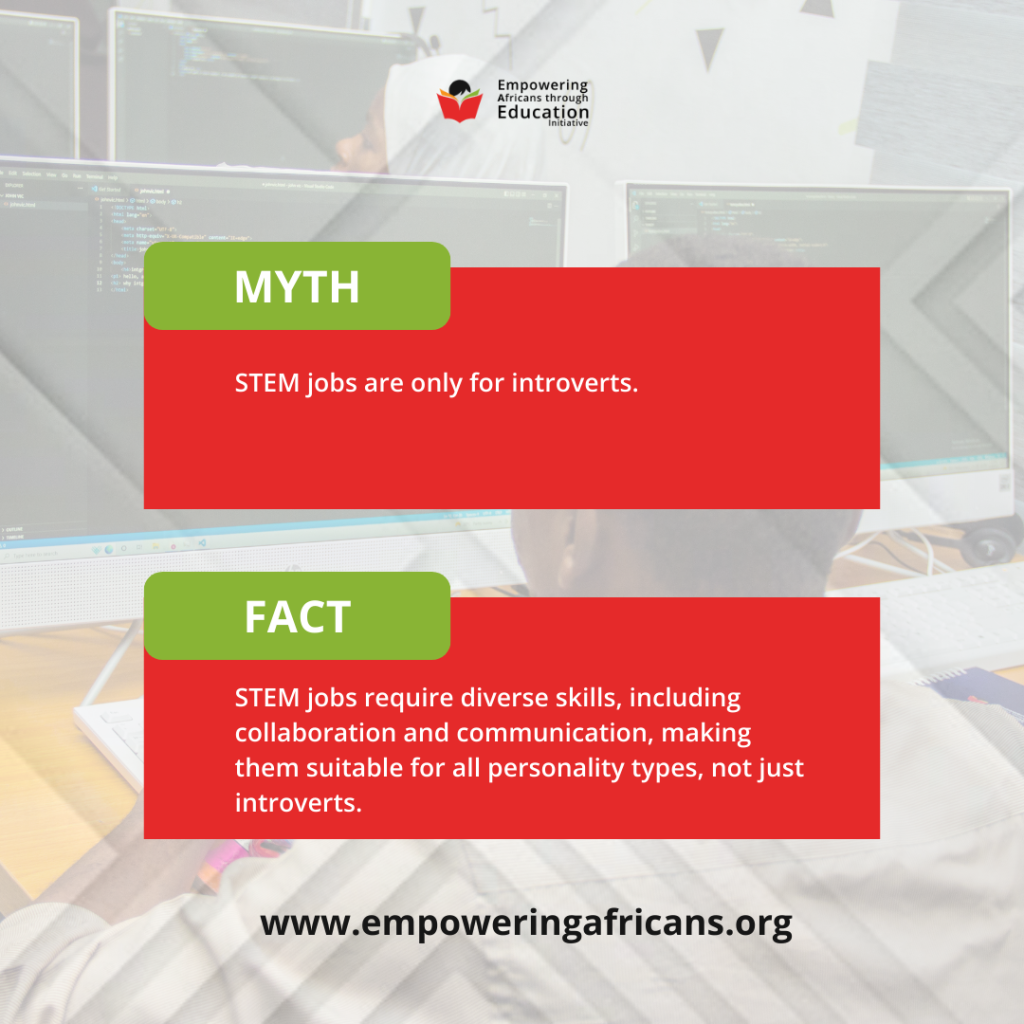STEM Jobs Are Only for Introverts: Debunking the Myth

When we think of STEM careers (science, technology, engineering, and mathematics), a common stereotype often arises: they are jobs for introverts, people who prefer working alone in quiet spaces, hunched over computers or lab equipment. But is this true? Are STEM fields really only suited for people who prefer solitude over socializing?
Let’s take a closer look at this myth and explore the reality of what STEM careers really entail.
The Myth: “STEM Jobs Are Only for Introverts”
This myth is rooted in the idea that STEM professionals spend their days in isolation, focused on complex equations, experiments, or coding without the need for much interaction. It suggests that to succeed in a STEM career, you must be someone who shies away from social events, team projects, and collaborative environments. It paints a picture of the “lonely scientist” or the “computer hacker” who works in a cubicle, disconnected from the outside world.
But is this an accurate representation?
The Reality: STEM Careers Need People Skills Too
In truth, STEM careers are not just about crunching numbers or staring at a screen. While some aspects of STEM work do involve solitary tasks, many require collaboration, communication, and teamwork. The most successful STEM professionals are often those who can work effectively with others, whether that means collaborating with a team of scientists, presenting research to clients, or working with engineers to bring a product to life.
Collaboration Is Key
Most STEM professionals work in teams, whether it’s designing a new technology, developing a medical treatment, or addressing environmental challenges. These projects often require input from people with diverse skills and perspectives. Engineers might work alongside designers, scientists, data analysts, and even business leaders to solve a problem. The ability to communicate ideas clearly and listen to others is essential.
Communication Matters
In a world that increasingly values data and innovation, the ability to communicate complex ideas is vital. STEM professionals often need to present their findings to colleagues, clients, or even the public. Whether it’s giving a presentation, writing reports, or discussing a project with a team, strong communication skills are a must in many STEM jobs.
Networking and Professional Relationships
Like any other field, networking plays a significant role in STEM. Attending conferences, collaborating with industry professionals, and building relationships with colleagues are all part of the STEM world. These connections can lead to new opportunities, partnerships, and advancements in one’s career.
What Does This Mean for You?
If you’re someone who is passionate about STEM but identifies more as an extrovert, or if you enjoy working in teams and engaging in lively discussions, the idea that you don’t belong in STEM may feel discouraging. But the truth is, STEM needs people like you!
Whether you’re an engineer who loves brainstorming solutions with a team, a biologist who enjoys presenting research, or a developer who thrives on collaborating with designers, STEM careers can provide plenty of opportunities for extroverts to shine.
Moreover, introverts and extroverts alike bring valuable skills to the table. Introverts might excel at deep concentration, critical thinking, and working independently, while extroverts bring energy, creativity, and the ability to connect with others. Together, these traits lead to well-rounded teams that can approach problems from multiple angles and innovate in new ways.
Breaking Down the Stereotype
Debunking the myth that STEM jobs are only for introverts helps make these fields more inclusive. It encourages a wider variety of people to consider STEM careers and fosters environments where different personality types can thrive.
The truth is, whether you’re an introvert who enjoys focused, independent work, or an extrovert who loves collaboration and communication, STEM careers offer a variety of roles to fit every personality. With the increasing demand for skilled professionals in STEM fields, the need for diverse talents and approaches has never been greater.
Conclusion
STEM jobs are not just for introverts, and the success of these fields relies on a wide range of personalities, skills, and strengths. Both introverts and extroverts can thrive in STEM, each contributing in their own unique ways. So if you’re someone who enjoys working with others, communicating ideas, and solving problems as part of a team, don’t let the stereotype hold you back—STEM careers are waiting for you!
By breaking down this myth, we open the door to more people pursuing careers in STEM, contributing to innovation and progress across the world. Whether you’re an introvert or extrovert, your passion for solving real-world problems is exactly what the STEM field needs.